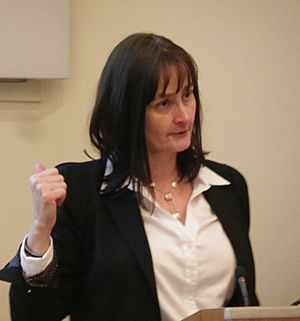Michele Dougherty facts for kids
Quick facts for kids
Michele Dougherty
|
|
|---|---|

Dougherty in April 2015
|
|
| Born |
Michele Karen Dougherty
1962 (age 63–64) |
| Alma mater | University of Natal |
| Known for | Magnetometer instrumentation for the Cassini-Huygens mission |
| Awards |
|
| Scientific career | |
| Fields |
|
| Institutions | Imperial College London |
Michele Karen Dougherty (born in 1962) is a British space scientist. She is a professor of space physics at Imperial College London. Professor Dougherty leads missions that explore planets like Saturn and Jupiter. She is also the main scientist for J-MAG, a special tool called a magnetometer. This tool is part of the European Space Agency's Jupiter Icy Moons Explorer (JUICE) mission, which launched in April 2023.
Professor Dougherty was appointed Executive Chair of the Science and Technology Facilities Council in September 2024. She is also set to become the President of the Institute of Physics in October 2025.
Early Life and Education
Michele Dougherty became interested in space when she was ten years old. Her father built a telescope, and through it, she saw the moons of Jupiter and Saturn. She studied at the University of Natal in South Africa. In 1989, she earned her PhD there. Her research was about how waves and tiny particles interact in different materials.
Space Research and Discoveries
After her studies, Professor Dougherty worked in Germany on applied mathematics. In 1991, she moved to Imperial College London. She became a Professor of Space Physics in 2004. She teaches university students while also doing her important research. She is also the head of the Physics Department at Imperial College London.
Professor Dougherty is the lead scientist for two big space missions. One was the NASA Cassini spacecraft, which orbited Saturn. The other is the ESA JUICE spacecraft, which will orbit Jupiter's largest moon, Ganymede.
Her work helped discover that Saturn's moon Enceladus has an atmosphere. This atmosphere contains water and hydrocarbons. This amazing discovery opened up new ideas in the search for extraterrestrial life (life beyond Earth).
The Royal Society honored Professor Dougherty for her leadership on the international Cassini-Huygens mission. She was the main scientist for the magnetic field tool on the Cassini spacecraft. Her work greatly improved our understanding of Saturn and its many Moons of Saturn. She remembers the close flybys of Saturn's moons as a highlight. She convinced the NASA team to fly closer than usual. She watched the data come back, feeling very excited and nervous!
Before Cassini-Huygens, Professor Dougherty worked on the magnetometer team for the Ulysses mission to Jupiter. She also worked on the NASA Jupiter System Data Analysis Program. This was part of the Galileo uncrewed spacecraft mission.
She often gives public talks and appears on TV and radio. She was a guest scientist on Jim Al-Khalili's The Life Scientific show.
Awards and Honors
In 2007, Professor Dougherty won the Chree Medal and Prize. This award was from the Institute of Physics. It recognized her work on planetary magnetic fields and atmospheres.
She won the 2008 Hughes Medal from the Royal Society. This was for her clever use of magnetic field data. This data led to finding an atmosphere around one of Saturn's moons. This discovery changed how we see the role of moons in the Solar System. She was only the second woman to receive this award, 102 years after the first.
In 2012, Professor Dougherty became a Fellow of the Royal Society. The UK Science Council also named her one of the top 100 living scientists in the UK. She received a special Royal Society Research Professorship in 2014.
In 2017, she received the Gold Medal of the Royal Astronomical Society for geophysics. She was the fifth woman ever to get this honor.
Professor Dougherty has helped the UK space sector a lot. She led the Science Programme Advisory Committee of the UK Space Agency from 2014 to 2016. She was made a Commander of the Order of the British Empire (CBE) in 2018. This was for her services to UK Physical Science Research. She also won the 2018 Richard Glazebrook Medal and Prize from the Institute of Physics. In 2019, she was named a Fellow of the American Geophysical Union.
See also
- List of women in leadership positions on astronomical instrumentation projects
 | William L. Dawson |
 | W. E. B. Du Bois |
 | Harry Belafonte |

